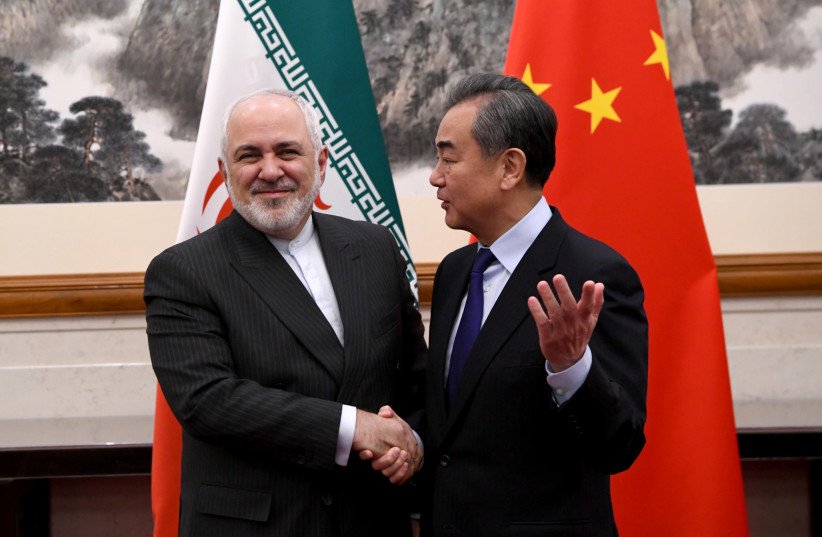
- ARAB NEWS
- 05 Jul 2025

The American playwright Wilson Mizner put it very well: Gambling is the surest way of getting nothing for something. There can be little doubt that Iran’s stunning, formal alliance with China amounts to one of the greatest strategic gambles of our time. There can also be little doubt that, in the end, Mizner will be proven right once again; this is a gamble that will, geostrategically, bring Tehran nothing.
Before we look at the actual terms of the deal and what it means, it is first necessary for us to stop in its tracks the tired but dangerous, center-left Wilsonian narrative that is already brewing about the Sino-Iranian pact. Iran, many in the foreign policy establishment are saying, was forced into this accord with Beijing by the US walking away from the nuclear deal with Tehran, and also because of the tough sanctions that have been placed upon it by Washington. Iran, in other words, had no choice.
This is the worst sort of postmodern drivel: Outsiders have forced someone to make a terrible decision for which they are not responsible. It is what bad parents say about their spoiled kids — they were forced into their bad behavior so it is not their fault. All Iran has to do to see sanctions removed and to rejoin the community of nations is to halt its decades-long desire to upset the strategic balance of power in the Middle East. But, of course, it will never do this.
Indeed, Tehran has continuously pursued an expansionistic regional foreign policy, both through the initiation of its nuclear program and its perpetual campaigns in Yemen, Syria and Iraq. The reality is that Iran’s foreign policy is so central to its leaders that it is prepared to foist endless economic suffering on its own people to keep the flame of expansionism alive. This is the fault of no one but Iran’s elite.
Now economically and diplomatically cornered, and precisely in order to keep its fading dream of regional domination going, Iran has taken its losing hand and doubled down by bringing China fully into the regional strategic game.
A July 11 leaked draft of the final agreement, obtained by the New York Times, makes for some chilling reading. First, Iran agrees to provide Beijing with oil at a discounted price. Second, China will become a major developer of Tehran’s oil, gas, and petrochemical facilities. Third, China will make putative investments in the banking, agricultural, infrastructure, and telecoms markets. Fourth, the two will have greatly enhanced military ties. While the pact has still to be agreed to by the Iranian Parliament, Supreme Leader Ali Khamenei has already given it his blessing.
It is not too much to say that all this amounts to a formal alliance between the two powers — a first of its kind for them both.
The repercussions of the deal are profound in political risk terms. First, it throws Tehran a lifeline to prop up the flailing Iranian economy; it is estimated that the deal could amount to $400 billion in Chinese investment in Iran over the next 25 years. Second, it undercuts the heretofore successful efforts of the US and its regional allies to isolate Iran’s revolutionary regime. Third, it bolsters the Iranian military by allowing for joint military exercises, greater joint research and weapons development, and intelligence sharing between the two. Fourth, it directly links China — the world’s single largest oil importer, getting 75 percent of its oil from abroad — with the vital and increasingly dilapidated Iranian energy industry. These are obviously all tremendous rewards to be won, if the Iranian gamble on its alliance with China actually pays off.
Iran has taken its losing hand and doubled down by bringing China fully into the regional strategic game.
Dr. John C. Hulsman
But there are two huge negatives to the wager. First, as has been the experience of countries such as Sri Lanka and Pakistan, working with China is a lot like working with the Mafia: Everything is alright, but only as long as you can pay. Otherwise, it will merely take what it feels it is owed. In the case of Sri Lanka, when it ran into predictable debt difficulties, the price was the loss to Beijing of its main port of Hambantota. Look for a similar experience here, given the Iranian government’s record of economic ineptitude. China is in line to finance and build port facilities at Jask, just outside the Strait of Hormuz. If Iran falls behind in its payments, the port could well amount to merely the next jewel in the Chinese crown of ports throughout the world.
Finally, for every action in international relations, there is always an equal and opposite reaction. New alliances call for the rejuvenation of old ones. Having successfully strategically countered Iran over the past few years, it is highly unlikely that the US and its regional allies will be cowed into submission. Rather, the Sino-Iranian pact will be seen in Washington for what it is: Confirmation that both these powers are enemies of America and require countering. In the end, Iran’s big bet, like most gambles, is likely to end in tears.